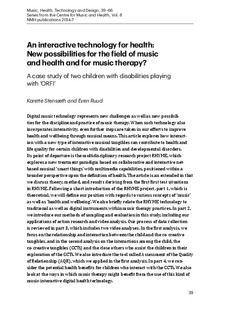An interactive technology for health: New possibilities for the field of music and health and for music therapy? A case study of two children with disabilities playing with ‘ORFI’
Chapter, Peer reviewed
Permanent lenke
http://hdl.handle.net/11250/279847Utgivelsesdato
2014Metadata
Vis full innførselSamlinger
- Artikler og bokkapitler [390]
Originalversjon
I: Music, Health, Technology and Design, s. 39–66Sammendrag
Digital music technology represents new challenges as well as new possibilities for the discipline and practice of music therapy. When such technology also incorporates interactivity, even further steps are taken in our efforts to improve health and wellbeing through musical means. This article explores how interaction with a new type of interactive musical tangibles can contribute to health and life quality for certain children with disabilities and developmental disorders. Its point of departure is the multidisciplinary research project RHYME, which explores a new treatment paradigm based on collaborative and interactive netbased musical ‘smart things’ with multimedia capabilities, positioned within a broader perspective upon the definition of health. The article is an extended in that we discuss theory, method, and results deriving from the first first test situations in RHYME. Following a short introduction of the RHYME project, part 1, which is theoretical, we will define our position with regards to various concepts of ‘music’ as well as ‘health and wellbeing’. We also briefly relate the RHYME technology to traditional as well as digital instruments within music therapy practices. In part 2, we introduce our methods of sampling and evaluation in this study, including our applications of action research and video analysis. Our process of data collection is reviewed in part 3, which includes two video analyses. In the first analysis, we focus on the relationship and interaction between the child and the co-creative tangibles, and in the second analysis on the interactions among the child, the co-creative tangibles (CCTs) and the close others who assist the children in their exploration of the CCTs. We also introduce the tool called Assessment of the Quality of Relationship (AQR), which we applied in the first analysis. In part 4, we consider the potential health benefits for children who interact with the CCTs. We also look at the ways in which music therapy might benefit from the use of this kind of music-interactive digital health technology. After presenting the background for RHYME, we will discuss aspects of data deriving from the experiments involving the CCTs called ORFI (see later). We will discuss the results deriving from our video analysis of two of the participating children, ‘Frode’ and ‘Ulla’. Our research question is threefold: How do the children relate to and interact with the co-creative tangibles; in what ways can their interaction become potentially health promoting; and how could music therapy profit from such interactive music therapy?
Utgiver
Norges musikkhøgskoleSerie
Series from the Centre for Music and Health;8NMH-publications;2014:7
Beslektede innførsler
Viser innførsler beslektet ved tittel, forfatter og emneord.
-
Life and Lullabies. Exploring the basis of meaningfulness in parents’ lullaby singing
Bonnár, Lisa (NMH-publikasjoner;2014:2, Doctoral thesis, 2014)Lisa Bonnár’s study furnishes opportunies of understanding Norwegian parents’ lullaby singing, a social and musical phenomen that has been hidden, until now, within the confines of private homes. Despite the vast research ... -
Institusjonaliseringen av de rytmiske musikkutdanningene ved Høgskolen i Agder
Tønsberg, Knut (NMH-publikasjoner;2007:2, Doctoral thesis, 2007)Hva skjer når et tradisjonelt klassisk musikkonservatorium etablerer utdanningstilbud innen alternative sjangere som pop, rock og jazz? Denne studien analyserer og beskriver utdanningen innen rytmisk musikk ved et norsk ... -
Harmony in conservatoire education. A study in the history of music theory in Norway
Utne-Reitan, Bjørnar (NMH-publikasjoner;2022:5, Doctoral thesis, 2022)Abstract - The point of departure for this dissertation is one of the most fundamental questions in music theory education: Why do music performance students need to study music-theoretical disciplines such as harmony ...
